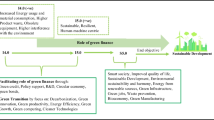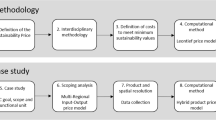Abstract
Climate change is the greatest threat to our planet and way of life. There is an immediate need of decarbonisation and a push for a smooth transition to a world with no net carbon emissions. To achieve sustainability, fast-moving consumer goods (FMCG) firms are increasing their efforts to reduce their carbon footprint across their supply chains. The firms and government undertake several initiatives towards achieving the zero carbon mission. Hence, there is a need to identify the prominent enablers that may enhance the decarbonisation in the FMCG sector and contribute towards a net-zero carbon economy. The current study has identified and assessed the enablers (6 main criteria, 19 sub-criteria), including green innovation, green supply chain, sustainable decision-making, organisation decisions and government control from environment, social and governance (ESG) perspective. Eco-friendly manufacturing techniques and eco-friendly goods may give businesses a competitive edge and sustainability. The six primary factors that can help to reduce decarbonisation are evaluated using the stepwise weight assessment ratio analysis (SWARA) technique. The criteria and sub-criteria are assessed by SWARA method. A total of 32 experts from the FMCG industry are undertaken to validate and assess the enablers. This study identified and evaluated the ESG-based decarbonisation enablers in FMCG. The study shows that green innovations are ranked first, followed by organisational decisions and government control. This is likely the first study to examine how the FMCG industry’s enablers for decreasing carbon footprints connect. The study is helpful to the supply chain managers and the other decision makers to implement well-designed processes for creating new products and a supply chain from the point of purchase to the place of supply, all backed by advanced technology and the appropriate regulatory adjustments.

Similar content being viewed by others
Data availability
The supplementary file is available on request.
References
Abid A, Mehmood U, Tariq S, Haq ZU (2022) The effect of technological innovation, FDI, and financial development on CO2 emission: evidence from the G8 countries. Environ Sci Pollut Res 29(8):11654–11662
Adebayo TS, Acheampong AO (2022) Modelling the globalization-CO2 emission nexus in Australia: evidence from quantile-on-quantile approach. Environ Sci Pollut Res 29(7):9867–9882
Ali SS, Kaur R, Jaramillo AB (2018) An assessment of green supply chain framework in Indian automobile industry using interpretive structural modelling and its validation using MICMAC analysis. Int J Service Operations Manage 30(3):318–356
Attaran M (2020) Digital technology enablers and their implications for supply chain management. Supp Chain Forum: an Int J 21(3):158–172
Dong F, Zhu J, Li Y, Chen Y, Gao Y, Hu M, Sun J (2022) How green technology innovation affects carbon emission efficiency: evidence from developed countries proposing carbon neutrality targets. Environ Sci Pollut Res, 29(24):35780–35799
Dwivedi YK, Hughes L, Kar AK, Baabdullah AM, Grover P, Abbas R, Wade M (2022) Climate change and COP26: Are digital technologies and information management part of the problem or the solution? An editorial reflection and call to action. Int J Inform Manage 63: 102456
Epoh LR, Mafini C (2018) Green supply chain management in small and medium enterprises: Further empirical thoughts from South Africa. J Trans Supp Chain Manage 12(1):1–12
Ge M, Kannaiah D, Li J, Khan N, Shabbir MS, Bilal K, Tabash MI (2022) Does foreign private investment affect the clean industrial environment? Nexus among foreign private investment, CO2 emissions, energy consumption, trade openness, and sustainable economic growth. Environ Sci Pollut Res 1–8
Ghosh M (2018) Determinants of green procurement implementation and its impact on firm performance. J Manuf Technol Manag 30(2):462–482
Ibrahim RL (2022) Beyond COP26: can income level moderate fossil fuels, carbon emissions, and human capital for healthy life expectancy in Africa? Environ Sci Pollut Res 29(58):87568–87582
Ivanov D, Sethi S, Dolgui A, Sokolov B (2018) A survey on control theory applications to operational systems, supply chain management, and Industry 4.0. Annu Rev Control 46:134–147
Kannan D, Solanki R, Kaul A, Jha PC (2022) Barrier analysis for carbon regulatory environmental policies implementation in manufacturing supply chains to achieve zero carbon. J Clean Prod 358:131910
Khanra S, Kaur P, Joseph RP, Malik A, Dhir A (2022) A resource-based view of green innovation as a strategic firm resource: present status and future directions. Bus Strateg Environ 31(4):1395–1413
Kuiti MR, Ghosh D, Gouda S, Swami S, Shankar R (2019) Integrated product design, shelf-space allocation and transportation decisions in green supply chains. Int J Prod Res 57(19):6181–6201
Kumar S, Barua MK (2022) A modeling framework of green practices to explore their interrelations as a conduit to policy. J Clean Prod 335:130301
Kundu S, Chakrabarti T (2018) Impact of carbon emission policies on manufacturing, remanufacturing and collection of used item decisions with price dependent return rate. Opsearch 55(2):532–555
Kurian J, Unnikrishnan S, Sawant B (2018) A study on green supply chain management practices in the Indian petroleum industries. Int J Services Operations Manage 31(2):260–276
Li J, Wang L, Tan X (2020) Sustainable design and optimization of coal supply chain network under different carbon emission policies. J Clean Prod 250:119548
Mathiyazhagan K, Datta U, Singla A, Krishnamoorthi S (2018) Identification and prioritization of motivational factors for the green supply chain management adoption: case from Indian construction industries. Opsearch 55(1):202–219
Mirzabeiki V, Aitken J (2022) Panarchy-based transformative supply chain resilience: the role of supply chain capital. Int J Oper Prod Manag. https://doi.org/10.1108/IJOPM-03-2022-0191
Mubarak A, Rahman I (2020) A comparative analysis of carbon emissions from transportation and logistics of the consumer goods industry in Southeast Asia. Int J Technol 11(2):333–341
Nasiri M, Ukko J, Saunila M, Rantala T (2020) Managing the digital supply chain: The role of smart technologies. Technovation 96:102121
Naz F, Agrawal R, Kumar A, Gunasekaran A, Majumdar A, Luthra S (2022) Reviewing the applications of artificial intelligence in sustainable supply chains: Exploring research propositions for future directions. Bus Strateg Environ 31(5):2400–2423
Nielsen IE, Majumder S, Sana SS, Saha S (2019a) Comparative analysis of government incentives and game structures on single and two-period green supply chain. J Clean Prod 235:1371–1398
Nielsen IE, Majumder S, Saha S (2019b) Exploring the intervention of intermediary in a green supply chain. J Clean Prod 233:1525–1544
Nozari H, Najafi E, Fallah M, HosseinzadehLotfi F (2019) Quantitative analysis of key performance indicators of green supply chain in FMCG industries using non-linear fuzzy method. Mathematics 7(11):1020
Preindl R, Nikolopoulos K, Litsiou K (2020) Transformation strategies for the supply chain: The impact of industry 40 and digital transformation. In Supply Chain Forum an Int J 21(1):26–34
Queiroz MM, Pereira SCF, Telles R, Machado MC (2019) Industry 40 and digital supply chain capabilities: a framework for understanding digitalisation challenges and opportunities. Benchmark an Int J 28(5):1761–1782
Race to Zero (2020) The Race to Zero Emissions by 2050 at the Latest, October 2020: https://racetozero.unfccc.int/what-isthe-race-to-zero/; Science Based Targets, Firms Taking Action: https://sciencebasedtargets.org/firms-takingaction (links as of 8/12/20).
Raihan A, Tuspekova A (2022) Toward a sustainable environment: nexus between economic growth, renewable energy use, forested area, and carbon emissions in Malaysia. Res, Conserv Recyc Adv 15:200096
Raihan A, Muhtasim DA, Farhana S, Pavel MI, Faruk O, Rahman M, Mahmood A (2022) Nexus between carbon emissions, economic growth, renewable energy use, urbanization, industrialization, technological innovation, and forest area towards achieving environmental sustainability in Bangladesh. Energy Clim Change 3:100080
Ramani V, Swami S, Ghosh D (2019) Price premium effect, supply contracts and strategic decision making under environmental considerations. Benchmark an Int J 28(5):1665–1696
Rani S, Ali R, Agarwal A (2022) Fuzzy inventory model for new and refurbished deteriorating items with cannibalisation in green supply chain. Int J Syst Sci: Operations Logistics 9(1):22–38
Rehman A, Alam MM, Ozturk I, Alvarado R, Murshed M, Işık C, Ma H (2022a) Globalization and renewable energy use: how are they contributing to upsurge the CO2 emissions? A global perspective. Environ Sci Pollut Res 1–14
Rehman A, Ma H, Ozturk I, Ulucak R (2022b) Sustainable development and pollution: the effects of CO2 emission on population growth, food production, economic development, and energy consumption in Pakistan. Environ Sci Pollut Res 29(12):17319–17330
Sahu NK, Sahu AK, Sahu AK (2018) Green supply chain management assessment under chains of uncertain indices: an intellectual approach. J Model Manag 25(7):2248–2271
Sarfraz M, Mohsin M, Naseem S (2022) A blessing in disguise: new insights on the effect of COVID-19 on the carbon emission, climate change, and sustainable environment. Environ Sci Pollut Res 29(20):29651–29662
Sarkar B, Sarkar M, Ganguly B, Cárdenas-Barrón LE (2021) Combined effects of carbon emission and production quality improvement for fixed lifetime products in a sustainable supply chain management. Int J Prod Econ 231:107867
Saxena S, Singh V, Gupta RK, Mishra NK, Singh P (2019) Green inventory supply chain model with inflation under permissible delay in finite planning horizon. Adv Sci Technol Eng Syst J 4(5):123–131
Sharma M, Joshi S, Govindan K (2021) Issues and solutions of electronic waste urban mining for circular economy transition: An Indian context. J Environ Manage 290:112373. https://doi.org/10.1016/j.jenvman.2021.112373
Shekhawat KK, Yadav AK, Sanu MS, Kumar P (2022) Key drivers of consumption-based carbon emissions: empirical evidence from SAARC countries. Environ Sci Pollut Res 29(16):23206–23224
Sundaram R, Sharma D, Shakya D (2020) Digital transformation of business models: A systematic review of impact on revenue and supply chain. Int J Manage 11(5)
Truby J, Brown RD, Dahdal A, Ibrahim I (2022) Blockchain, climate damage, and death: Policy interventions to reduce the carbon emissions, mortality, and net-zero implications of non-fungible tokens and Bitcoin. Energy Res Soc Sci 88:102499
Author information
Authors and Affiliations
Contributions
Manu Sharma: supervision, methodology, validation, formal analysis, investigation, data curation, writing. Janmejai Kumar Shah: writing—review and editing; Sudhanshu Joshi supervision, writing—review and editing. All authors read and approved the final manuscript.
Corresponding author
Ethics declarations
Ethics approval
Reference No. Ref. No. GEU/DOMS/00–20-22/1.
Consent to participate
Not applicable.
Consent for publication
Not applicable.
Competing interests
The authors declare no competing interests.
Additional information
Responsible Editor: Arshian Sharif
Publisher's Note
Springer Nature remains neutral with regard to jurisdictional claims in published maps and institutional affiliations.
Appendices
Appendix 1
Appendix 2

Rights and permissions
Springer Nature or its licensor (e.g. a society or other partner) holds exclusive rights to this article under a publishing agreement with the author(s) or other rightsholder(s); author self-archiving of the accepted manuscript version of this article is solely governed by the terms of such publishing agreement and applicable law.
About this article
Cite this article
Sharma, M., Shah, J.K. & Joshi, S. Modeling enablers of supply chain decarbonisation to achieve zero carbon emissions: an environment, social and governance (ESG) perspective. Environ Sci Pollut Res 30, 76718–76734 (2023). https://doi.org/10.1007/s11356-023-27480-6
Received:
Accepted:
Published:
Issue Date:
DOI: https://doi.org/10.1007/s11356-023-27480-6




